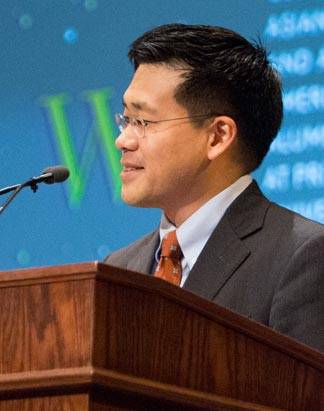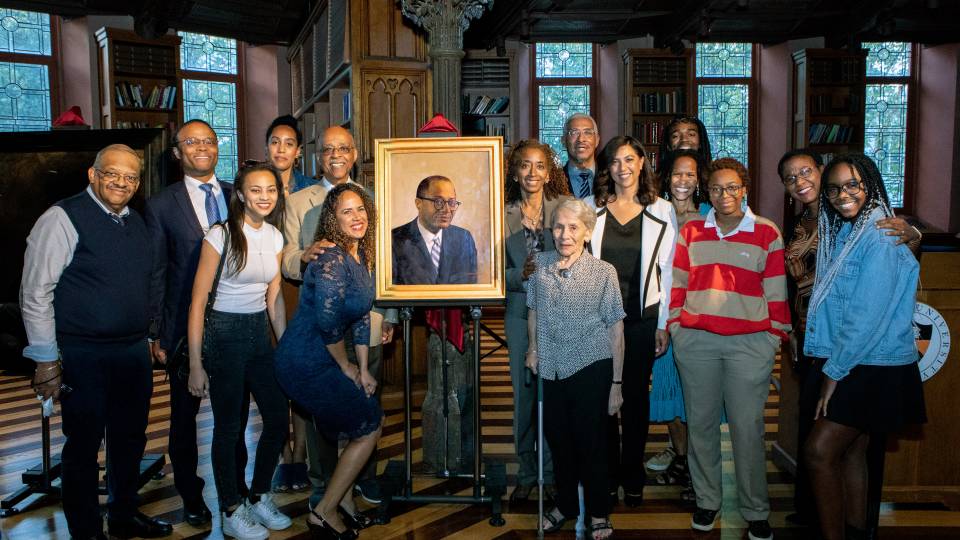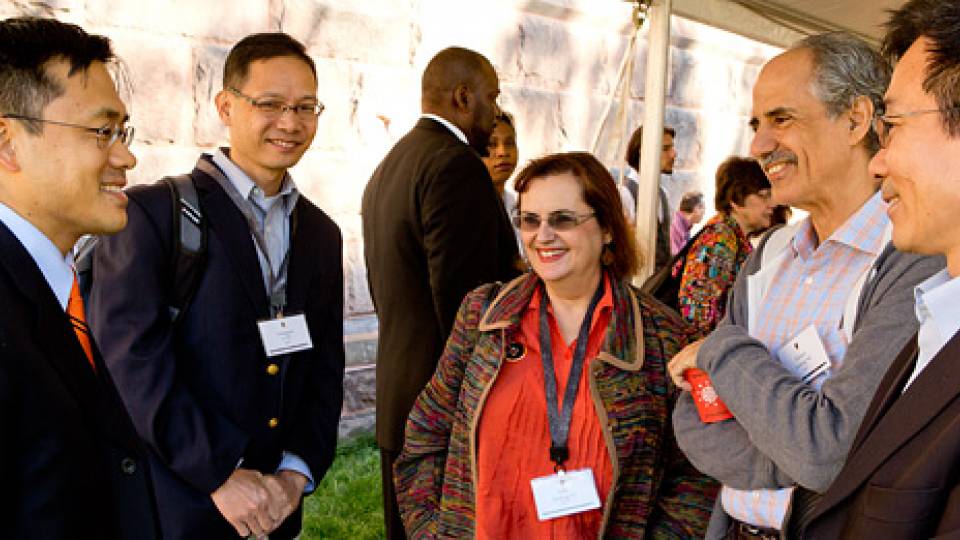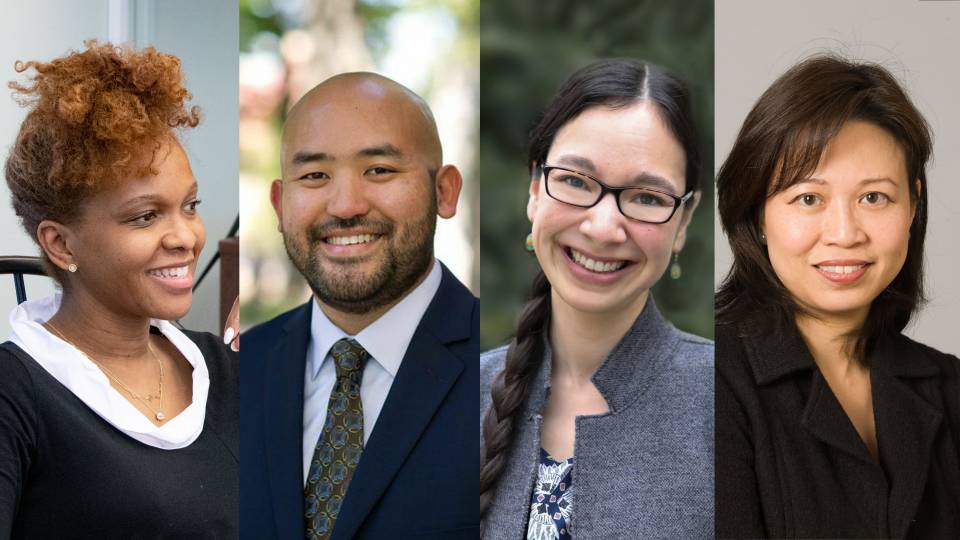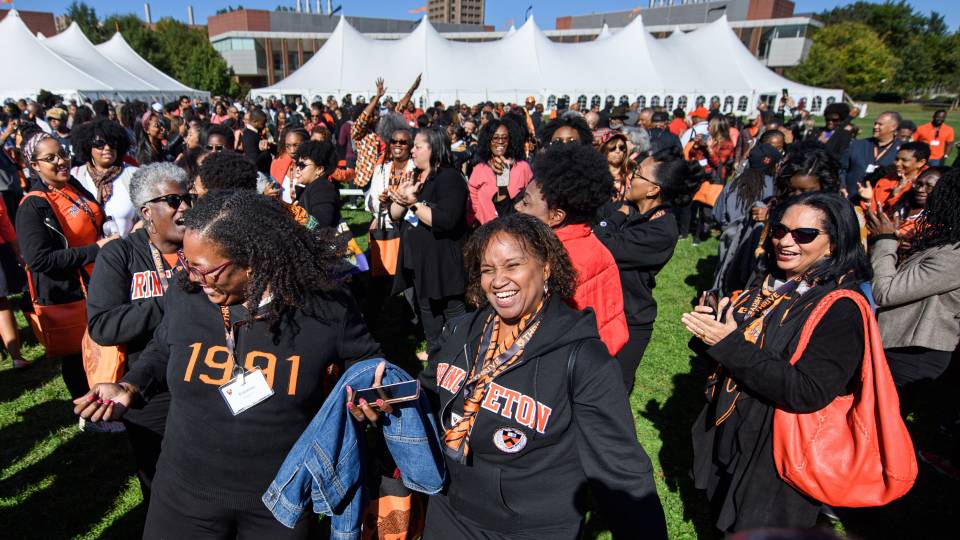Asian and Asian American alumni from around the world gathered on the Princeton University campus Oct. 15-17 to celebrate their significance to the Princeton community. Building on Princeton's motto, "Dei Sub Numine Viget," the "We Flourish" conference brought together more than 700 alumni and guests for discussions, lectures, performances, tours, and social and networking events.
"We Flourish" was the first gathering of its kind for Princeton's Asian and Asian American alumni. The attendees represented a wide range of undergraduate and graduate classes, academic fields and backgrounds. Alumni traveled from 27 states and 12 countries to attend the conference organized by the Office of the Alumni Affairs with support from a steering committee of alumni and the Association of Asian American Alumni of Princeton (A4P).
During his welcome remarks in Richardson Auditorium on Friday, President Christopher L. Eisgruber said he was grateful to alumni for coming back to celebrate the vibrancy and leadership of Princeton's Asian and Asian American community. He noted the extraordinary leadership the community is providing to the University in his administration, the Board of Trustees, faculty and student body.
"It is an extraordinary time and I think this weekend will be a wonderful and marvelous celebration," said Eisgruber, a 1983 alumnus.

Princeton President Christopher L. Eisgruber welcomes alumni back to campus for the "We Flourish" conference. Eisgruber called the weekend a celebration of the vibrancy and leadership of Princeton's Asian and Asian American community. (Photo by Denise Applewhite, Office of Communications)
Provost David S. Lee, a 1999 graduate alumnus, credited Asian and Asian American alumni with paving the way for today's Princetonians. Lee's speech on Friday was followed by the premiere of a video highlighting the Asian community's history at Princeton, beginning with 1876 alumnus Hikoichi Orita of Japan.
"Without your perseverance at Princeton, even when at times you felt like an outsider within the Princeton community, without your success here and post-graduation, and without your role as ambassadors for Princeton and as role models for future students, today's students would not have seen Princeton as a place for which to aspire and about which to dream," Lee said to alumni.
Lee also traced the growth of the Asian and Asian American student body from "a handful" of students in the 1950s to the 22 percent of students in this year's freshman class who are Asian American.
"It is due to your loyalty and your continued success and contributions to the wider world, and most importantly it is due to your desire to see all members of the Princeton family flourish, that we can dream with great hope and anticipation about what is next for future members of the Princeton family," Lee said. "I am excited about what this group can do together because when you flourish, Princeton will flourish."
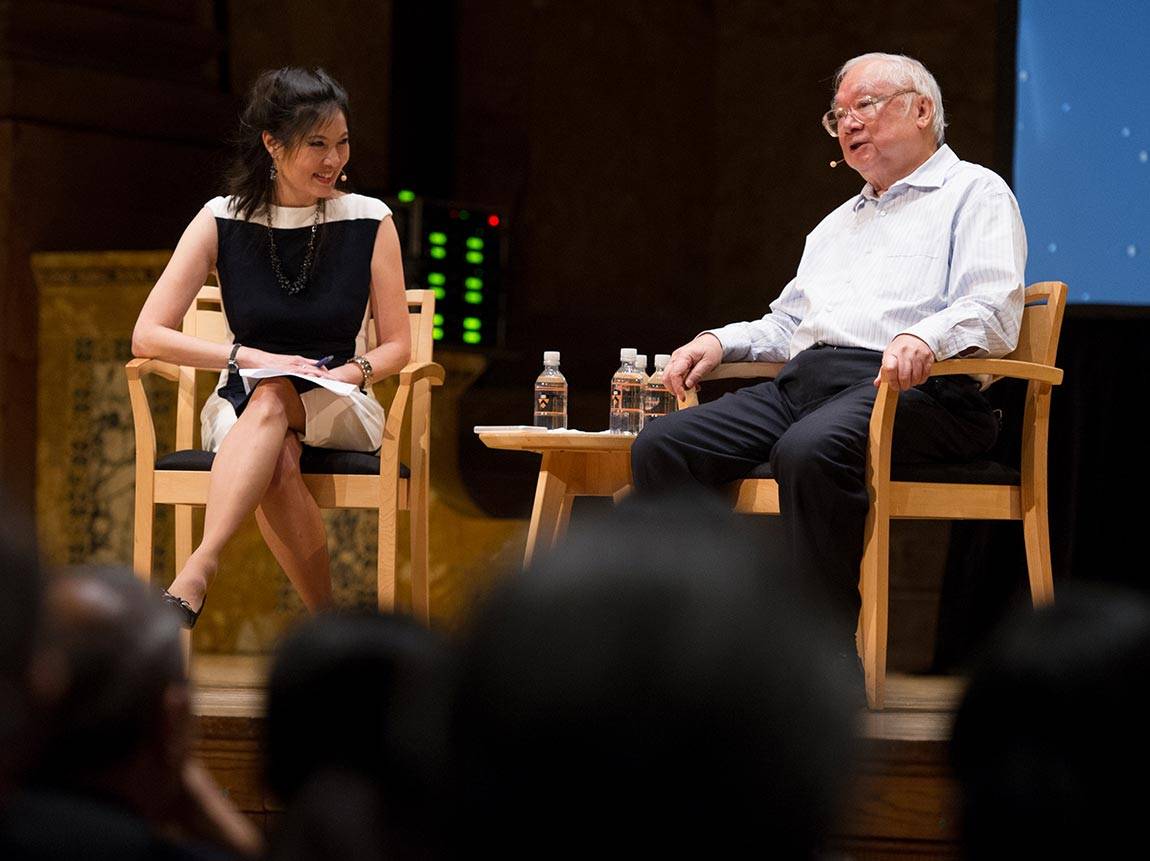
Sir Gordon Wu (right), chairman of Hopewell Holdings Ltd., speaks with journalist and author Sheryl WuDunn (left) about his days as an undergraduate, his business philosophy and his support of Princeton. Wu is a 1958 alumnus and former University trustee, and WuDunn is a 1988 graduate alumna and University trustee. (Photo by Sameer A. Khan/Fotobuddy for the Office of Alumni Affairs)
On Saturday evening, Sir Gordon Wu, chairman of Hopewell Holdings Ltd., spoke with Pulitzer-prize winning journalist and author Sheryl WuDunn about his days at Princeton, his business philosophy and his philanthropy to the University and other organizations. Wu is a 1958 alumnus and former University trustee, and WuDunn is a 1988 graduate alumna and University trustee.
Wu recounted how he returned home to Hong Kong after studying engineering at the University.
"My father told me, 'You have done very well. You have graduated from Princeton. I want to give you your entitlement,'" Wu said. "He said 'your entitlement is to hard work, now go and get a job.' Those were probably the best words I ever heard. And I have been working hard ever since."
After reading from a 1991 article she wrote about one of Wu's many projects in Asia, WuDunn asked Wu about keys to his success. Wu recalled advice he received in one of his first Princeton classes: "First thing, define the problem. Second, find the solution."
"The important thing is, don't worry about failures," Wu said. "But don't jump recklessly. Before you do, you have to do some calculations. It's a matter of doing something that is useful and efficient for other people. In other words, it's of service to other people."
In closing, Wu encouraged alumni packed inside Richardson Auditorium to be of service to Princeton in any way they can.
"I believe that Princeton is a wonderful institution. I really hope and pray that every one of you believe that when you are here — whether it was 50 years ago or you are just coming in — is not an entitlement. It is something you really respect," Wu said. "Five dollars or $5 million is the same. Just keep your interest and support of Princeton because the world needs institutions like this to be able to move forward."

Mung Chiang (far left), the Arthur LeGrand Doty Professor of Electrical Engineering, director of the Keller Center and chair of the Princeton Entrepreneurship Council, moderates an alumni panel on "Creativity, Innovation and Entrepreneurship." Panelists from left to right are: Eva Lerner-Lam, Class of 1976; William Ju, Class of 1978; Tarun Khanna, Class of 1988; and Timothy Hwang, Class of 2014. (Photo by Denise Applewhite, Office of Communications)
Commitment to Asian and Asian American studies
During his remarks earlier in the weekend, Eisgruber spoke of the University's commitment to the study of Asia and the Asian American experience, as well as Princeton's international connections to Asia.
Eisgruber cited as examples the recent establishment of the Center on Contemporary China, as well as faculty in a range of fields, including, among others, Chang-rae Lee and Jhumpa Lahiri in the Lewis Center for the Arts; Anne Cheng in the departments of English and African American studies; and Thomas Christensen in the Woodrow Wilson School of Public and International Affairs.
To strengthen Princeton's resources, Eisgruber said the University is working to recruit more faculty in Asian American studies. He said the University also is planning to launch a strategic planning task force to look at the future of American studies at Princeton, including Asian American studies.
"I think we have an opportunity right now to do something very special and distinctive in Asian American studies that will establish a leadership role for Princeton in the field," Eisgruber said. "I think we should do something really special here that will matter intellectually not only to our own faculty and students, but to the world."
Eisgruber said the University also is finding more ways for students and faculty to study and conduct research in Asia, and noted his own commitment to the region.
"I have been to [Asia] in each of my first two years as president," Eisgruber said. "This year I will make my third trip to Asia and the first trip by a Princeton president to India. … It will be the beginning, I hope, of many more such trips to signal the importance of this area to us and to continue to build connections there."
Eisgruber updated alumni about life at Princeton today, such as the opening of the Andlinger Center for Energy and the Environment; the explosion of artistic activity on campus including the Arts and Transit Project under construction; new initiatives to expand entrepreneurial engagements among students, faculty and alumni; and the University's continued efforts to increase the socioeconomic diversity of the student body through its generous financial aid program.
Embracing and celebrating identity
Conference lectures showed the influence of Asian and Asian American alumni in fields ranging from business, law, journalism, the arts, media, education and more.
Judge Denny Chin, of the U.S. Court of Appeals for the Second Circuit, spoke about his career on the bench and his family's heritage. Chin, a 1975 alumnus and University trustee, was the first Asian American appointed as a U.S. District Judge outside of the Ninth Circuit.

University Trustee and 1975 alumnus Denny Chin speaks about his career as a judge and his family's heritage during a conference lecture. Chin is a judge on the U.S. Court of Appeals for the Second Circuit. (Photo by Denise Applewhite, Office of Communications)
Chin said: "When my grandfather was alive I didn't think of him as a trailblazer or a hero. After all, I thought, he was just a Chinese waiter. It was only later that I came to appreciate all that he did as he came to this country as a young man, speaking no English with no money. One of my grandfather's proudest moments was when I was accepted to Princeton. Even my grandfather … knew what an honor and a privilege it was to be a student at this great university."
Other alumni speakers included: Chris Lu, U.S. Deputy Secretary of Labor; Kavita Ramdas, senior adviser on global strategy for the Ford Foundation; and Helen Zia, author, journalist and activist.
Many speakers said Princeton was a place where they explored and embraced their identity. During a panel on the undergraduate and graduate student experience today, senior Ella Cheng said she traveled to China for the first time through the Princeton-in-Beijing program.
"If there is anything that Princeton has done for me is to make me more aware and proud of my Asian American history," said Cheng, president of the Undergraduate Student Government. "I became aware of where I fit in society at Princeton and in America. And, in terms of academics, Princeton has helped me become much more cross-disciplinary and interdisciplinary in my perspective."
Akshay Mehra, president of the Graduate Student Government and a third-year doctoral candidate in geosciences, credited the Hindu Life Program in the Office of Religious Life with helping him get in touch with his background.
"It's really nice at Princeton that religious life and identity is considered much more holistically," he said.
Alumni on the panel "Creativity, Innovation and Entrepreneurship" shared how their diverse personal and professional backgrounds led them to entrepreneurial endeavors.
Class of 2014 alumnus Timothy Hwang, CEO of Fiscal Note, said the entrepreneurial spirit at Princeton has grown tremendously even since he was a freshman. He also credited Princeton's liberal arts background with developing the wide range of skills entrepreneurs need to lead their own organization.

Alumni gather in East Pyne Courtyard to sample food prepared by Campus Dining during an Asian night market. More photo, video and social media highlights from the conference are available on the Alumni Association website. (Photo by Sameer A. Khan/Fotobuddy for the Office of Alumni Affairs)
A flavor of campus
With the campus flourishing in fall foliage, alumni gathered at a variety of events, including a performing arts showcase, Taiko drumming workshop, Ping Pong demonstration, and receptions where friends reconnected and alumni from all classes mingled.
On Thursday night, East Pyne Courtyard was transformed into an Asian night market featuring delicacies prepared by Campus Dining to represent the flavors of Karachi, Mumbai, Seoul, Singapore, Shanghai, Taipei and Tokyo.
"When I was an undergraduate, I dreamed of an event like this happening," said Sarah X. Chen, Class of 2013. "I was president of the Asian American Students Association and we always wanted to tap into this amazing network of Princeton alumni."
Class of 1977 alumnus Danilo Joa said he had been looking forward to this particular alumni event.
"There have been conferences for black alumni, women alumni and other groups," Joa said. "It was a great opportunity to have an Asian alumni gathering at Princeton."
Pei-ting Chou, a 2005 graduate alumna in molecular biology, traveled from Taiwan for the weekend.
"There was a lot of planning that made this conference possible. It is worth it for me to fly here," she said. "I am looking forward to learning more about the Asian and Asian American experience — how the Princeton experience influenced Asian alumni, and how Asian students can influence the Princeton campus."

(From left to right) Vicki Takeuchi Wynne, Class of 1974, Chun-Wai Chan, Class of 1975, and Chuen Yee, Class of 1975, reconnect during a break at the "We Flourish" conference celebrating Asian and Asian American alumni. (Photo by Denise Applewhite, Office of Communications)
Hemant Srivastava, a 2000 graduate alumnus in chemistry, said he was interested in attending panels to hear alumni share their varied experiences and career paths.
"I was born and raised in Canada, but my father is Indian and my mother is Chinese. This conference certainly resonated with me in regards to my Asian identity as well," he said.
Nancy Mak, Class of 1980, said she often visits Princeton from her home in northern California. Mak said she was one of a handful of Asian or Asian American undergraduates when she was a student 35 years ago.
"I love any excuse to come back. I learned so much here and felt like I really grew up here," she said. "This conference is really a big move. This is who I am. I am a Chinese American and I also am a proud Princetonian. This conference makes us feel like we are no longer part of the minority, like when I was a student. When I come back to campus the University welcomes me like family."
The Alumni Association website includes more "We Flourish" conference photo, video and social media highlights of the conference.

The conference included a variety of lectures, panel discussions, networking opportunities and cultural events, such as a performing arts showcase in Richardson Auditorium featuring Princeton Bhangra and other music and dance groups. (Photo by Sameer A. Khan/Fotobuddy for the Office of Alumni Affairs)
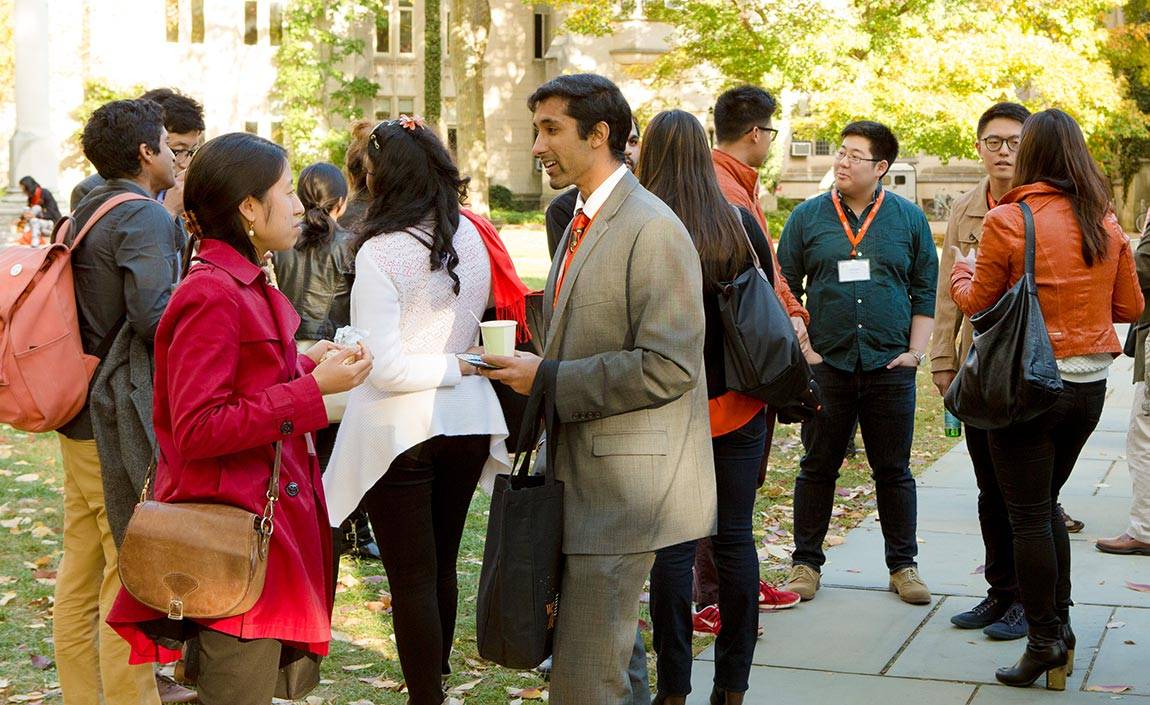
With the campus flourishing in fall foliage, alumni mingle and catch up with friends. The event was the first gathering of its kind for Princeton's Asian and Asian American alumni. (Photo by Denise Applewhite, Office of Communications)

Class of 2013 graduate Sarah X. Chen takes a selfie with friends attending the conference. Chen was president of the Asian American Students Association as an undergraduate and said the alumni event was a dream come true. (Photo by Denise Applewhite, Office of Communications)
